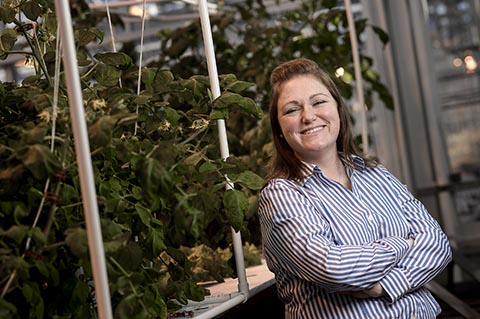February 15, 2016
Purdue Profiles: April Agee Carroll
 |
|
April Carroll is the director of phenomics at Purdue. She is working with students and faculty on research that could contribute to feeding the world. Their work is a key part of the Plant Sciences Research initiative of Purdue Moves. (Purdue University photo/Charles Jischke) |
The director of phenomics at Purdue once was a music and business major at California State University, Fullerton. One science class would change her career path and possibly, one day, the world.
April Agee Carroll said she found a professor who saw her potential and encouraged her to pursue a career in biology. Her focus shifted and she received a bachelor's degree in biological sciences and continued her career in research by obtaining a doctorate in plant cell biology, molecular biology and genetics from the University of California, Riverside. As the director of phenomics, which is the study of all observable physical and biochemical traits of organisms, Carroll is working with students and research that could contribute to feeding the world.
Why did you choose plant biology as a focus?
I actually didn't think I wanted to be a plant biologist. I just knew I wanted to save the world somehow. I had big goals and big dreams, as every 20-year-old does. I started doing research thinking I would cure cancer or something, but feeding the world didn’t really enter into my viewpoint until I started to do this work with plants. I realized how important it is to understand basic mechanisms, but also to apply what we know about basic functions to crop plants. I really fell in love with this idea of plant science and then branched out into using enabling technologies to help move plant science forward.
How has the Plant Sciences Research initiative of Purdue Moves elevated the University?
I think the pipeline is going to enable students and faculty to take their research to the next level. There is phenomenal research being done and they can collect higher quality data and eliminate some of the more tedious tasks with automation. They can still learn the science of how to measure how tall a plant is, but they can do it with an unmanned aerial vehicle instead of a yardstick. They can still learn the fundamental understanding of plant form and development, but they can do a much larger experiment and have bigger impact on the scientific body of knowledge. I think that gives them more training because they are learning about aviation technology, federal regulations, breeding and field plot management, all of which contribute to feeding the world.
It also is very student-focused. I got to participate in the Molecular Agriculture Summer Institute when I arrived here and it was wonderful. We had 13 high school students from all over the state of Indiana come here. I can speak from experience: Having research experience at an early stage in my academic career totally got me hooked and made me want to do this.
What is automation in this context?
Students often measure basic characteristics of a plant with manual, traditional tools like a yardstick or by visually counting and recording the number of leaves on a plant. Automation aims to use image-based methods to quantify measurable characteristics that we can observe by eye so that the researcher’s time and focus can be used elsewhere. This allows for larger, more informative experimental data sets and more in-depth analysis.
What is plant phenotyping and how can it be used?
A phenotype is any measurable characteristic of an organism or an ecosystem. For instance, height, hair and eye color are all part of a person's phenotype. We take phenotypes of any type of organism and, as we learn more about them, we try to tie that back to what we know about genomes. Even though we have decoded the human genome, we don’t fully understand how that manifests in a person. Or, how all of these plant genomes manifest into plants. There is a ton more variability in the plant kingdom. We are trying to tie this massive explosion of information from the genome back to something meaningful and, for plant biologists, that's yield.
Writer: Megan Huckaby, 765-496-1325, mhuckaby@purdue.edu

